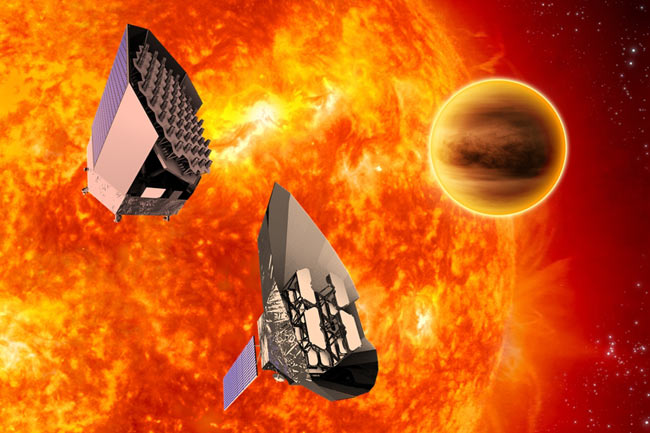New Space Observatory Could Join Hunt for Alien Planets

Anew European space observatory could join the hunt for life-bearing planetsbeyond our solar system if it is selected for full development next year.
ThePLATO (Planetary Transits and Oscillations of Stars) observatory is one ofthree missions that sharing a ?3.65 million (about $5.8 million U.S.)development grant from the U.K. Space Agency, British space officials have said.These missions are part of the European Space Agency's Cosmic Vision program,which places heavy emphasis on space science.
InJune 2011, ESA will choose two of the three missions to be fully developed forlaunch between 2014 and 2020. The two other missions competing with PLATO areEuclid, which would examine the nature of dark energy and dark matter, andSolar Orbiter, which would travel closer to the sun than any previoussolar-observing mission.
PLATOis designed to search for alien planets orbiting stars beyond our solar system in the MilkyWay galaxy. [TheStrangest Alien Planets]
Thediscovery of planets that could harbor life "is one of the major scientific andphilosophical challenges of our time," said Don Pollacco of Queen'sUniversity Belfast in the U.K., principal investigator of the internationalPLATO Science Consortium, which includes seven U.K. institutions. "Themission would focus on solar systems close enough to be scanned forbio-signatures, or signs of life by later missions and ground-basedtelescopes."
ThePLATO spacecraft would use the transit technique to search for alien planets, which looks for subtle changes in theluminosity of a star's emitted light.
Thisfaint dimming could indicate that the star hosts a planet, which, at the point when the light changes, is transiting in front ofthe star and partially obscuring its light.
Breaking space news, the latest updates on rocket launches, skywatching events and more!
Ifthe PLATO mission is chosen to be fully developed, the U.K. and other ESAmember states will design the spacecraft's scientific instruments and financeits construction.
"Weenvisage that the new PLATO spacecraft would be launched between 2017 and 2020,on a Russian Soyuz Fregat rocket," Pollacco said. "We hope it will bepowerful enough to detect rocky planets in the habitable zones of sun-likestars, those regions around a star where liquid water can exist. In otherwords, it could find new earths."
- Gallery - Strangest Alien Planets
- Top 10 Extreme Planet Facts
- Hundreds of Possible Alien Planets Discovered By NASASpacecraft

Denise Chow is a former Space.com staff writer who then worked as assistant managing editor at Live Science before moving to NBC News as a science reporter, where she focuses on general science and climate change. She spent two years with Space.com, writing about rocket launches and covering NASA's final three space shuttle missions, before joining the Live Science team in 2013. A Canadian transplant, Denise has a bachelor's degree from the University of Toronto, and a master's degree in journalism from New York University. At NBC News, Denise covers general science and climate change.
